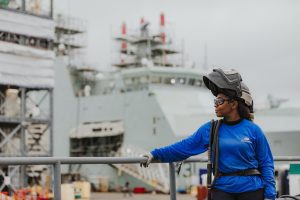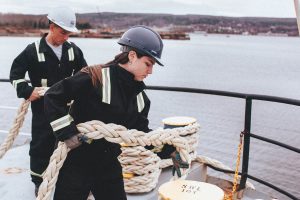Introduction

CEWIL Canada defines Work-integrated Learning as “a form of curricular experiential education that formally integrates a student’s academic studies with quality experiences within a workplace or practice setting. WIL experiences include an engaged partnership of at least: an academic institution, a host organization, and a student. WIL can occur at the course or program level and includes the development of student learning objectives and outcomes related to: employability, agency, knowledge and skill mobility and life-long learning.”
Work-Integrated Learning (WIL) at Nova Scotia Community College (NSCC) is an innovative and transformative approach to education that seamlessly integrates classroom theory with real-world practice. At NSCC, Work-integrated Learning provides students with invaluable opportunities to gain work experience. Students have the opportunity to collaborate with industry professionals and community partners, develop employment readiness skills, enhance their classroom-based learning through real world applications, and grow their professional networks.
Most NSCC programs have a Work-integrated Learning component. As an industry/community partner, you are an active participant in the education journey, affording our students a genuine chance to put their skills into practice and apply the knowledge they have acquired in both classroom and laboratory settings.
Work-integrated Learning involves a three-way partnership between the student, employer/community partner and NSCC, and each party plays a critical role in ensuring the success of the partnerships.
At NSCC, we have nine types of work experience to meet the academic outcomes of the program and prepare you for your future careers in your chosen professional or occupational fields. Depending on the program of study, a student may engage in more than one type of work experience. The types are detailed below. If you would like additional detail on what type of work experience a student is available to complete with your organisation, please reach out to workexperience@nscc.ca.
Field Experience
Students engage in a diverse array of work-related experiences, which may be either paid or unpaid. These field experiences are closely linked to specific courses and are mandatory for graduation. The frequency, duration and timing of a field experience may differ depending on the NSCC program. All Work-integrated Learning courses are scheduled for a specific semester. The most typical field experience spans approximately 175 hours, lasting for about 5 weeks, (typically 35 hours per week), and takes place during the third semester (April-May).
Co-operative Education (co-op)
Enabling a student to “earn while you learn,” students enrolled in either a mandatory or optional Co-op course as part of their program have a unique opportunity to acquire invaluable experiences as they advance towards your second year of studies. Co-op courses are strategically scheduled between your first and second year, enabling them to apply their skills from first year, gain additional experience and skills and advance their skill development in second year. Co-op work-terms offer paid full-time (35-40 hours) employment, lasting 12-16 weeks, (420-640 hours) depending on the program. This immersive work experience enriches your educational journey and equips the student with practical skills and industry insights.
Internships
Exclusively offered through our Ocean Technology program, the internship component is both mandatory and highly valuable. These paid internships take place during the final semester and typically span 14 to 16 weeks of full-time employment. They provide students with meaningful, hands-on experience in real-world settings, allowing them to apply their skills, build confidence, and prepare for success in their chosen careers.
Professional Practice
Unpaid work placements are mandatory for obtaining a professional license or designation in various fields, including clinical placement, practicums, preceptorships and more. These hands-on experiences provide students with practical training and the opportunity to apply their classroom knowledge in real-world settings. Such placements are essential for developing the necessary skills and competence required for a successful career in their chosen professions.
Sea Time
Allows students to apply the knowledge and skills essential for working aboard a vessel. These opportunities may be paid or unpaid, with varying durations and terms depending on the program, encompassing fall, winter, spring, or summer. Several marine programs at NSCC have sea time requirements, governed by guidelines established by Transport Canada. Sea time can be fulfilled by gaining experience on both Canadian and international merchant ships.
Career Exploration
Provide students with the opportunity to explore careers through activities such as job shadowing and informational interviews. These experiences offer valuable insights into your industry and help students build workplace literacy in a field related to their studies.
Industry Project
Partner with students to work on real-world projects that apply their academic knowledge, allowing them to contribute meaningful solutions while gaining practical experience in your organization.
Service Learning
Collaborate with students on projects that create a positive impact in the community while reinforcing their classroom learning through real-world application
Entrepreneurship
Support students as they explore opportunities to develop and operate their own business ventures, applying entrepreneurial skills as part of their academic coursework.

If you have any questions related to hiring a student, work experience or work-integrated learning please email NSCC’s Career and Employment Services team at workexperience@nscc.ca

